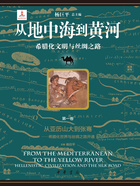
小结
亚历山大东征是欧亚大陆古代诸文明关系的一个分水岭。此前,尽管有埃及新王国的对外扩张,有赫梯帝国、亚述帝国、新巴比伦王国、米底王国的建立,但它们毕竟范围有限,仅限于近东一带。即使后来横跨欧亚非三大洲的波斯帝国,也只是政治、军事上的集合体,而非文化的统一体,波斯帝国各地的文化传统根深蒂固。希腊和波斯的接触始于希波战争,但波斯的惨败决定了希腊、波斯长久对立的政治格局。希腊北部的马其顿王国的崛起打破了这种平衡,一场大战不可避免。腓力二世的突然遇刺给其子亚历山大提供了征服波斯的借口,也给其带来了名扬千古,建立比波斯帝国更为庞大的帝国的机缘。亚历山大因此与未来的丝绸之路开通也就建立了遥远而有机的联系。
(杨巨平)
(1)相关论述,详见Arnold Toynbee, A Study of History, Vol. I, Oxford: Oxford University Press,1948, pp. 256-260 (especially see pp. 258-259). 关于汤因比的挑战与应战理论,详见p.271ff.
(2)Arrian, Anabasis of Alexander, 3.4, with an English translation by P. A. Brunt, Cambridge, Mass.: Harvard University Press, 1996.
(3)详见M. M. Austin, The Hellenistic World from Alexander to the Roman Conquest: A Selection of Ancient Sources in Translation, Cambridge and New York: Cambridge University Press,1981, No. 227, pp. 374-378.
(4)参见杨巨平:《娜娜女神的传播与演变》,《世界历史》2010年第5期,第103—115页。
(5)F. W. Walbank, The Hellenistic World, Glasgow: William Collins Sons & Co. Ltd., 1981, p.221; https://www.ancient.eu/Marduk/.
(6)Amélie Kuhrt, The Persian Empire: A Corpus of Sources from the Achaemenid Period, Vol. 1, London and New York: Routledge, 2007, p. 492 (§10).
(7)Herodotus, The Histories, 7.66, with an English translation by A. D. Godley, Cambridge, Mass.: Harvard University Press, 1938.
(8)关于中亚草原这些游牧民族的分布、生活、习俗、宗教信仰以及与南部农耕世界的冲突等,详见Strabo, Geography, 11.8, with an English translation by Horace Leonard Jones, Cambridge, Mass.: Harvard University Press, 1988.
(9)Strabo, Geography, 11.8.3.
(10)《史记》卷一二三《大宛列传》,二十四史点校本,北京:中华书局,1982年,第3161页。
(11)《史记·大宛列传》:“奄蔡在康居西北可二千里,行国,与康居大同俗。控弦者十余万。临大泽,无崖,盖乃北海云。”这里的大泽、北海当指里海或咸海。
(12)详见Karl Jaspers, The Origin and Goal of History, New Heaven: Yale University Press, 1965, pp. 1-21.
(13)Strabo, Geography, 11.11.1.
(14)Horace, Satires, Epistles and Ars Poetica, “To Augustus”, in Epistles, II.1.156, with an English translation by H. Rushton Fairclough, Cambridge, Mass.: Harvard University Press, 1999.
(15)D. Panagiotopoulos, “Keftiu in Context: Theban Tomb-Paintings as a Historical Source,” Oxford Journal of Archaeology, Vol. 20, No. 3 (2001), pp. 263-283 (esp. 263-264).
(16)Herodotus, The Histories, 1.1-5.
(17)见Herodotus, The Histories, 2.152, 154, 178-179.
(18)昔列尼的殖民者来自铁拉岛(Thera,今圣托里尼岛,Santorini)的希腊人,但移民者的身份和移民原因自希罗多德时代就有两种说法,一说是因干旱,七年无雨,为寻求新的生存之地,由巴图斯(Battus)率领前往;另一说一位巴图斯和一批铁拉人感到命运不好,就先移民昔列尼,后来又有大批的铁拉人前往。见Herodotus, The Histories, 4.151-153, 156-159.
(19)Herodotus, The Histories, 5.28.
(20)Herodotus, The Histories, 3.90.
(21)Herodotus, The Histories, 4.89, 97-98, 141.
(22)Herodotus, The Histories, 8.32-33, 53; 9.13.其中雅典的神庙经历过两次焚烧。波斯人先是在占领雅典时烧毁了卫城的神庙,萨拉米斯海战后波斯人撤离雅典前,又烧毁了雅典城和还剩下的神庙。
(23)参见Xenophon, Anabasis, with an English translation by Carleton L. Brownson, Cambridge, Mass.: Harvard University Press, 1980;[古希腊]色诺芬:《长征记》,崔金戎译,北京:商务印书馆,1985年。
(24)Arrian, Anabasis of Alexander, 2.7;[古希腊]阿里安:《亚历山大远征记》,李活译,北京:商务印书馆,1985年,第57—58页。
(25)Herodotus, The Histories, 5.22, 8.137-139.其中谈到马其顿王国的建立者帕狄卡斯(Perdiccas)如何从阿尔戈斯流落到马其顿,并征服此地为王的过程。
(26)Herodotus, The Histories, 5.21, 8.136.亚历山大一世为了报复波斯使者的荒淫要求,谋杀了他们,为平息事端,他把自己的妹妹巨该娅(Gygaea)嫁给了负责寻找这些使者的波斯贵族布列巴斯(Bubares),此人是薛西斯一世的远房堂兄弟(the second-degree cousin)。
(27)Herodotus, The Histories, 5.17-21; 7.185; 9.31.
(28)Herodotus, The Histories, 7.173; 9.44-45.
(29)一说他的父亲帕狄卡斯二世在位时(Perdiccas II,约公元前454/448—前413年)就把Pella作为都城。Quintus Curtius Rufus, History of Alexander, “Introduction,” with an English translation by John C. Rolfe, Cambridge, Mass.: Harvard University Press, 1998, p. xxiv.
(30)Aristotle, Politics, 5.8.10.
(31)Plutarch, Alexander, 10.4.
(32)Waldemar Heckel and J. C. Yardley, Alexander the Great: Historical Texts in Translation, Malden, Mass.: Blackwell Publishing Ltd., 2004, p. xvii.
(33)说他追查那些阴谋的参与者,并惩罚了他们。参见Plutarch, Alexander, 10.4, with an English translation by Bernadotte Perrin, Cambridge, Mass.: Harvard University Press, 1996; On the Fortune of Alexander, I.3 (327 c), with an English translation by Frank Cole Babbitt, et al., Cambridge, Mass.: Harvard University Press, 1994; Justin, Epitome of the Philippic History of Pompeius Trogus, 9.7.12, 11.2.1, 12.6.14, translated by J. C. Yardley, Atlanta, GA: Scholar’s Press, 1994; Diodorus Siculus, The Library of Histories, 17.2.1, 3-5, with an English translation by C. Bradford Welles, Cambridge, Mass.: Harvard University Press, 1963.
(34)Arrian, Anabasis, 2.14.5.
(35)Arrian, Anabasis of Alexander, “Introduction”, 15 (p. xxvi-xxvii), 46 (p. lx).
(36)Quintus Curtius, History of Alexander, 4.1.12.
(37)Arrian, Anabasis, 1.17.9, 25.1-3.
(38)事实上,亚历山大就有伪造大流士三世来信的惯例。见Diodorus Siculus, The Library of Histories, 17.39; Arrian, Anabasis of Alexander, 2.14.1 (n.1).